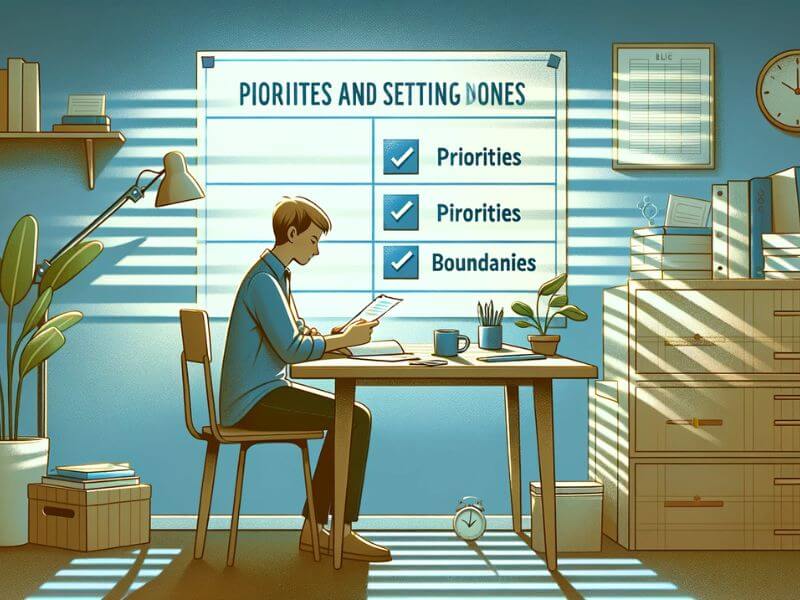Balancing Act: Managing Work, Life, and Personal Growth
Are you constantly juggling the never-ending demands of work, life, and personal growth? It feels like an impossible task, doesn’t it?
Well, fear not, because ‘Balancing Act: Managing Work, Life, and Personal Growth’ is here to help you navigate this chaotic tightrope walk. In this short guide, we will provide you with practical strategies and techniques to identify your priorities, set boundaries, and manage your time effectively.
You will also learn how to nurture your personal growth and practice self-care, all while maintaining effective communication and collaboration with others. And the best part? You will discover how to find the support you need and build a supportive network to help you achieve balance in every aspect of your life.
So, let’s dive in and find your equilibrium!
Identifying Priorities and Setting Boundaries
To effectively manage your work, life, and personal growth, it’s crucial to identify your priorities and set clear boundaries. By understanding what truly matters to you and establishing limits on your time and energy, you can navigate through the various demands of life with greater ease and efficiency.
Start by taking a step back and reflecting on what’s most important to you. What’re your long-term goals, both personally and professionally? What values do you hold dear? Once you have a clear understanding of your priorities, you can align your actions and decisions accordingly.

Setting boundaries is equally important. Learn to say no when necessary and avoid overcommitting yourself. Establish designated time for work, family, and personal pursuits. By creating these boundaries, you can protect your time and energy, preventing burnout and ensuring a healthy work-life balance.
Remember, it’s okay to prioritize yourself and your well-being. You don’t have to be everything to everyone. By setting clear boundaries and identifying your priorities, you can focus on what truly matters and make progress towards your goals.
Time Management Techniques for Work-Life Balance
Achieve a healthy work-life balance by implementing effective time management techniques.
Time management plays a crucial role in maintaining a harmonious equilibrium between work and personal life. Start by prioritizing your tasks and creating a schedule that allows for both work and leisure activities. Set realistic goals and allocate specific time slots for each task, ensuring that you have enough time to relax and rejuvenate.

Avoid multitasking, as it can lead to decreased productivity and increased stress. Instead, focus on one task at a time, completing it before moving on to the next. Learn to delegate tasks that can be done by others, freeing up your time for more important responsibilities.
Additionally, limit distractions such as excessive use of social media or constantly checking emails. By setting boundaries and dedicating specific times for these activities, you can increase your productivity and create more time for personal activities.
Nurturing Personal Growth and Self-Care
Start nurturing personal growth and taking care of yourself by regularly incorporating self-care practices into your daily routine. It’s easy to get caught up in the demands of work and life, but it’s important to remember to prioritize your own well-being. Self-care isn’t selfish; it’s necessary for your overall mental, emotional, and physical health.
One way to nurture personal growth is by setting aside time each day for activities that bring you joy and fulfillment. This could be anything from reading a book, practicing a hobby, or spending time in nature. It’s important to do things that make you happy and help you grow as an individual.

Another important aspect of self-care is taking care of your physical health. Make sure to prioritize exercise, eat nutritious meals, and get enough sleep. Your body needs proper care in order to function at its best.
In addition to these daily practices, it’s also important to take regular breaks and vacations to recharge and rejuvenate. This could be as simple as taking a short walk during your lunch break or planning a weekend getaway. Taking time for yourself isn’t only beneficial for your own well-being, but it also allows you to show up as your best self in other areas of your life.
Strategies for Effective Communication and Collaboration
Improve your communication and collaboration skills by implementing effective strategies in your daily interactions.
One important strategy is active listening. When you actively listen, you show others that you value their thoughts and opinions. Maintain eye contact, nod, and ask clarifying questions to ensure you understand their perspective.

Another strategy is clear and concise communication. Avoid using jargon or technical terms that others may not understand. Instead, use simple and straightforward language to convey your message effectively.
Additionally, practice open and honest communication. Be transparent about your goals, expectations, and concerns. This helps build trust and fosters a positive work environment.
Collaboration is also crucial for effective communication. Encourage teamwork and brainstorming sessions to generate new ideas and solutions. Foster a culture of inclusivity and respect, where everyone feels comfortable contributing their thoughts and opinions.
Lastly, embrace technology tools that facilitate communication and collaboration, such as project management software, video conferencing platforms, and instant messaging apps.
Finding Support and Building a Supportive Network
To build a supportive network and find the support you need, connect with like-minded individuals who share your goals and values. Surrounding yourself with a supportive network can make a significant difference in your personal and professional growth. Seek out individuals who understand your aspirations and are willing to offer guidance, encouragement, and a listening ear.

Start by identifying the areas in which you need support. Is it career advice, personal development, or simply someone to vent to? Once you have a clear understanding of your needs, seek out groups or communities that align with your interests. This could be joining professional organizations, attending networking events, or participating in online forums. Engage in conversations and build connections with individuals who share similar ambitions.
Remember that building a supportive network is a two-way street. Be open to offering support and guidance to others as well. By sharing your knowledge and experiences, you can create a mutually beneficial relationship where both parties can learn and grow.
Additionally, don’t limit yourself to just one network. Explore different communities and groups to diversify your support system. Each network can offer unique perspectives and opportunities for growth.
Conclusion
In conclusion, finding a balance between work, life, and personal growth is crucial for overall well-being.
By identifying priorities and setting boundaries, practicing effective time management techniques, nurturing personal growth and self-care, and fostering communication and collaboration, you can create a harmonious and fulfilling life.
Remember to seek support and build a network of people who can help you navigate the challenges and celebrate the successes along the way.
So, embrace the balancing act and enjoy the journey of managing work, life, and personal growth.







